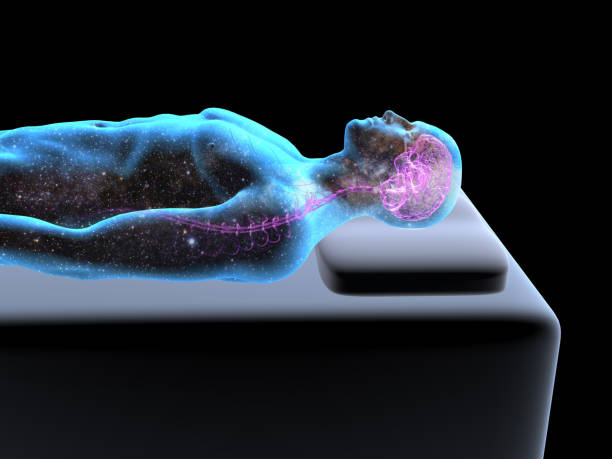
Sleep, a snatcher!
How do you feel seeing sleep, your endearing partner, being showcased as a grabber? Although, not as a land-grabber but a time-grabber! The worst case appears to be the latter.
The human body and brain are like machines doing various activities; if left to operate without pauses, they will explode or knock and become useless. Whenever the brain and body are overworked, a natural fatigue alert in the brain is triggered, resulting in sleep to allow rest and resetting of the body and brain. Sleep forcefully shuts down the operations of the brain and body over such a time duration, suitable to allow the body and brain to regenerate, get ready, and restart their operations. Sleep does this whether one is willing or unwilling. Indeed, sleep is an oppressor, but a favourable oppressor!
Researches has shown that our oppressor holds us down for up to a third of our lifetimes. What exactly happens during the remaining two-thirds that necessitates a one-third break?

During life, the brain and body activities include thinking, feelings, expressions and actions. Thinking is the process of considering something or reasoning it out, guided by one’s belief system. Consideration and reasoning are both active performances, and require some alertness to be performed. It is observed that once the brain is alert, thinking goes on spontaneously and continuously, either organized with intention or unorganized without intention.
The things to think are supplied from different sources like perceptions by the physical senses of sight, hearing, smell, touch or taste. It can also be from imaginations, memories, and experiences.
Can you also recall that, from nowhere, matters for consideration randomly invade the thinking processes? This thinking can occur about anything, at any time and any place, provided that there is content to be considered from any of the supply sources and some required alertness is on ground.
Why do we think? The targets for thinking are interpreting and understanding matters, recalling memory, creating ideas, considering possibilities, taking decisions, solving problems, and sometimes, no-clear-cut purposes. The thinking can proceed at fast or slow paces, and vary in duration depending on the content of consideration, who is considering, when and where it is taking place and lastly why it is being considered. Likewise, the depth of thinking depends on similar variables and can be shallow, deep or of bottomless depth. The outcomes from the various targets for thinking tell what we do as a result of the thinking.

Firstly, thinking brews some feelings, manifested as emotions.
Secondly, the feelings and emotions gives rise to expressions through verbal or non-verbal communication. The expressions sends the messages about our thinking and feelings, and also receive provoked corresponding responses.
Lastly, the thinking in conjunction with the generated feelings and stirred expressions propel actions by different body parts. These actions are either in separate or harmonized modes. This manifests as different body movements like clapping, standing, walking, dancing, sports; chores like cooking and cleaning; jobs like carpentry, reading, writing, trading, service operations, etc.
These series of human activities can go on without stopping as they are all connected to thinking, which is a continuous activity. This means that they can go on until the brain and body, like machines, knock. Thankfully, to avert such ‘knocking of the brain and body machines’, there exists an in-built brain regulatory switch that activates sleep mode and temporarily shuts down the brain and body activities in response to fatigue or exhaustion. The purpose of this is to provide time for rest and recuperation.
Now, take me for example
My brain thinks out this write-up; interesting and challenging facts in my thoughts evokes my interest for the write-up; this emotion is expressed voicing out the topic and format to my team; then my thinking and emotions propel me into researching and writing.
Additionally, my findings rouse in me more feelings of fascination; this further emotion may be expressed by increased energy in my writing; this increased energy pumps my body toward finding more, typing more, thinking more, and on goes the train of this endless cycle – until I am about to crash, my engine starts jerking and my favourable oppressor comes diligently to its work station.

Sleep operates like a caring dictator. It must shut down the activities of the brain and body, whether or not we are willing, to ensure regeneration of the body and brain for further activities. Sleep, to achieve this naturally set regulatory target, consumes not less than one third of the human lifetime. That which consumes such a fraction of our lifetime resource and preserves us as machines from ultimate break-down deserves intentional and deliberate attention. Such attention should consider all that makes the sleep quality good.
Here are some of the tips for a good quality sleep:
- SAFE exercises (physical activities)
- Healthy diet and weight management
- Healthy social habits – avoid smoking, stimulants and excess alcohol
- Adequate stress management
- Enough rest and leisure (regular sleep schedule)
- Adequate body function raw materials (water, oxygen, sugar, etc.)
- Safe drug use – NO drug abuse, USE prescribed sleeping drugs ONLY.
- Peaceful and relaxing sleep environment
- Conducive sleeping surfaces for supportive posture
Remember, where you sleep, when you sleep and how you sleep affect your mental health, physical wellbeing and living a healthy life. We all need quality sleep to be well for more productivity in our endeavours.

Do you need further information on the above subject?
Are you looking for the best way to maintain quality sleep for generally wellbeing and healthy living?
Are you currently facing any sleeping difficulty?
Remember, a doctor is an appropriate person to offer relevant advice for maintenance of quality sleep and solution to sleep difficulties.
Do you want to contact the Orthopaedic Sleep Consultant, Dr Charles Uzodimma, kindly send your request to sleepinfo@vitafoam.com.ng
Vitafoam is passionate about quality sleep, healthy living and general wellbeing of Nigerians. We are proudly Nigerian and constantly supports Nigerians with consistent quality products for comfort and wellbeing.
With Vitafoam, you don’t just sleep, we give you the comfort that gets you recharged.
To learn more about Vitafoam, visit www.vitafoamng.com